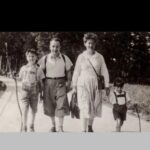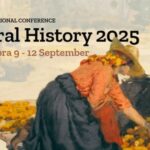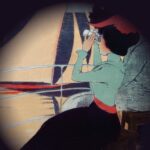 Dokumentation von Helene Maimann (A, 2016, 53 Min.): Käthe Leichter – Eine Frau wie diese (Web)
Dokumentation von Helene Maimann (A, 2016, 53 Min.): Käthe Leichter – Eine Frau wie diese (Web)
Der Film wurde ausgestrahlt unter dem Titel „Käthe Leichter – eine Frau im Widerstand“ in der Reihe „Kreuz und Queer“ auf ORF 2 am 16.07.2024 und ist in frei verfügbar in der Meditathek „Joyn“ (Web)
Beschreibung: „1895 geboren als Tochter einer großbürgerlichen jüdischen Familie rebelliert Marianne Katharina Pick schon früh gegen die Konventionen der Zeit: Sie schließt sich der bürgerlichen Jugendbewegung an und studiert als eine der ersten Frauen Staatswissenschaften und Nationalökonomie. Der Erste Weltkrieg und die Nachkriegsrevolutionen radikalisieren die junge Wissenschaftlerin. Käthe Leichter wirft sich mit Herz und Seele in die Arbeiterbewegung. Sie glaubt fest an den Sozialismus und daran, die Befreiung des Menschen und damit auch die der Frauen selbst noch erleben zu können.
Mit ihren umfangreichen Untersuchungen über das Leben von arbeitenden Frauen versucht Käthe Leichter, die Frauen zu ermutigen, um ihre Gleichstellung in Beruf und Familie zu kämpfen. Bis zuletzt gibt sie die Hoffnung auf den Sieg ihrer Überzeugungen nicht auf. Sie geht nach dem Bürgerkrieg vom Februar 1934 zusammen mit ihrem Ehemann, dem Journalisten Otto Leichter, und den beiden Söhnen ins Schweizer Exil, um wenig später zurückzukehren und eine führende Rolle im Widerstand gegen den autoritären Ständestaat einzunehmen. Nach dem ‚Anschluss‘ Österreichs an das Deutsche Reich im März 1938 verkennt Käthe Leichter ihre gefährliche Lage als jüdische Frau, widerständige Sozialdemokratin und Intellektuelle und bleibt, um legal auszuwandern. Ende Mai 1938 verhaftet sie die Gestapo. Nach eineinhalb Jahren Haft wird sie zu einer mehrmonatigen Gefängnisstrafe verurteilt und danach sofort wieder der Gestapo übergeben. In dieser Zeit schreibt sie ihre ‚Kindheitserinnerungen‘, ein bewegendes Zeugnis über die untergegangene Welt des Wiener jüdischen Bürgertums, gewidmet ihren beiden Söhnen Heinz und Franz, die wie ihr Vater das rettende Ausland erreichen konnten. Internationale Interventionen und Visas, die auf dem britischen und amerikanischen Konsulat auf sie warten, nützen nichts: Sie wird Ende 1939 in das KZ Ravensbrück deportiert und im März 1942 ermordet.
In Helene Maimanns Porträt erzählen neben ihrem Sohn Franz Leichter, dem späteren langjährigen State Senator von New York die Historikerinnen Jill Lewis, Gabriella Hauch, Veronika Duma, Linda Erker, Elisabeth Klamper und Sabine Plakolm sowie der Soziologe Christan Fleck aus dem Leben einer der großen Pionierinnen Österreichs.“
Call for sessions for the seventh biennial conference of the European Rural History Organisation (09/2025, Coimbra); by: 30.09.2024
 European Rural History Organisation (EURHO) (Web)
European Rural History Organisation (EURHO) (Web)
Time: 09.–12.09.2025
Venue: Coimbra, Portugal
Proposals by: 30.09.2024
The 7th Biennial Conference of the European Rural History Organisation (EURHO) continues the tradition of the EURHO conferences, held before in Bern (2013), Girona (2015), Leuven (2017), Paris (2019), Uppsala (2021/22) and Cluj (2023).
The EURHO Rural History Conferences have provided a welcoming atmosphere to present the results of already consolidated projects or to test exploratory ideas. The study of rural and agrarian past has involved researchers and students from different disciplines. Historical perspectives have usually been shared with anthropologists, archaeologists, architects, economists, geographers, linguists, sociologists and, recently, biologists, geneticists and chemists. Following the trends of previous conferences, Rural History 2025 in Coimbra would like to receive proposals for sessions and papers that cross analytical perspectives, interdisciplinary methodologies and new scientific objects. The current challenges facing science and society call for new contributions from scholars working on different perspectives of our rural and agrarian past. The Organising Committee encourages the submission of proposals that promote in-depth and pluralistic analyses, dealing with any chronology or territory.
Sessions will be led by a chair or by a chair and a discussant, and will have at least three papers. Each session organisers can decide the maximum number of papers in their panels, although the organising committee recommend no more than 5 proposals for each session, as it will take up two hours. If necessary, the possibility of double sessions could be considered, at the request of those interested, if the space availability allows it. Read more and source … (Web)
Organisers: Univ. of Coimbra, Dulce Freire (Center for Inderdisciplinary Studies & Faculty of Economics) and Carlos Manuel Faísca (Faculty of Arts and Humanities and Researcher, Center for Interdisciplinary Studies) as Chairs of the International Scientific Committee and the Portuguese Organising Committee
CfP: New Perspectives on Walking Women in Anglophone Literatures and Cultures (Event, 03/2025, Hamburg); bis: 07.10.2024
Sandra Dinter; Institut für Anglistik und Amerikanistik, Univ. Hamburg
Time: 28.-29.03.2025
Venue: Warburg-Haus, Hamburg
Proposals by: 07.10.2024
Although women have always walked and written about their manifold experiences as pedestrians, they were largely neglected in the historiography of walking of the twentieth century. As Deirdre Heddon and Cathy Turner noted in 2012, it had been common practice in cultural and literary histories of walking to present women “as an ‘exception’ to an unstated norm, represented by a single chapter in a book or even a footnote” (225). Following the publication of Lauren Elkin’s Flâneuse: Women Walk the Streets of Paris, New York, Tokyo, Venice and London (2016), research on walking women has expanded and diversified significantly in recent years. Kerri Andrews’s Wanderers: A History of Women Walking (2020) and Way Makers: An Anthology of Women’s Writing about Walking (2023) and Annabel Abbs’s Windswept: Why Women Walk (2022), for example, focus exclusively on the writings and representations of women walkers. Critics have begun to develop new approaches to reading, documenting, and theorising women’s pedestrian mobilities, employing practice-based approaches (e.g. Heddon and Myers 2020) and taking into account archival material (e.g. Bredar 2022) and perspectives from material ecocriticism (e.g. Hamilton 2018). Rather than examining representations of women’s walking according to masculine paradigms like Romantic wandering, flânerie, or psychogeography, critics now increasingly examine woman walkers on their own terms.
This conference brings together scholars from the humanities and social sciences (e.g. from literary studies, cultural studies, film, TV and theatre studies, art, history, sociology, anthropology, geography etc.) who are working on roles and representations of walking women in Anglophone literatures and cultures from the early modern period to the immediate present. The aim of the conference is to assess current trends in scholarship on walking women, to identify its blind spots, and to develop new perspectives on women walkers by deliberately looking at forms, contexts, media, and periods that have received less or no attention so far. Read more and source … (Web)
CfP: Feminist Perspectives on Social Policy – Global Conversations (Publication); by: 31.08.2024
socialpolicy.ch. The Open-Access-Journal for Social Policy Research in Switzerland; Ingela Naumann and Laura Meier, Univ. of Fribourg (Web)
Proposals by: 31.08.2024
Despite internationally diverse lived experiences within different socio-political and economic contexts, the Covid-19 pandemic – once more – put a spotlight on one common denominator around the world: the persistence of gender inequalities. It revealed intensified gender inequalities with respect to health and access to health care, the distribution of care work, gainful employment and income, and the risks of being subjected to gender-based violence, just to mention a few. An international body of evidence is expanding on the negative impact of gender inequalities on the wellbeing and prosperity of individuals and societies. At the same time, we observe how long fought-for women rights such as the right to abortion (see e.g. USA) or the right to education (see e.g. Afghanistan) are put into question by deepening ideological and political rifts and with anti-gender rhetoric gaining popularity. Showcasing and discussing feminist perspectives on social policy and women’s social welfare worldwide is thus more topical than ever.
This Special Issue brings together diverse feminist approaches to social policy, highlighting theoretical debate, policy and practice examples from around the world. Feminisms, in their aim to address gender inequalities, fight against oppression and improve the lives of women, has taken different paths, forms and orientations in different cultural, religious, political and legal contexts. This Special Issues aims to critically examine the normative underpinnings and social, economic and political dynamics that lead to gendered inequalities, while encouraging international dialogue between multiple gender-sensitive perspectives aimed at improving social welfare and wellbeing in theory, policy and practice.
The editors welcome theoretical, empirical (qualitative as well as quantitative) or action-oriented contributions that bring different feminist perspectives on social policy and social welfare in conversation to each other to encourage ongoing feminist debate: e.g. between liberal feminist theory and relational ethic of care theory; across different policy fields (reproductive health, work/family balance, poverty and social security, social and ecological sustainability and so forth), and between feminist practice and activism in different countries and world regions (e.g. reproductive rights campaigns in the US, Southeastern Europe and Latin America). They particularly welcome contributions that bridge Global North/Global South/Global East divides … read more (PDF).
Source: GenderCampus
CfP: Gender and Warfare (Event, 10/2024, Aix en Provence); by: 01.08.2024 [REMINDERIN]
Aix Marseille Univ. and Freie Univ. Berlin; Maria Tudosescu and Anna Elisabeth Gehl
Time: 02.-03.10.2024
Venue: Aix en Provence
Proposals by: 01.08.2024
Providing an intercultural and interdisciplinary space for exchange and discussion for researchers, this workshop aims to take a closer look at the nuanced interplay between gender and warfare throughout history and the multifaceted relationship between gender, conflict and society. PhD students and postdocs from various disciplines are invited to present their research on the topic and engage in discussions meaning to enhance understanding of gender as a category in warfare. The aim of the workshop is to question how gender influences the perception of war, violence and warfare, as well as shaping experiences, roles and remembrance. The event will practice critical analysis skills for examining gendered narratives in conflict scenarios and also create a space for networking between researchers working in related fields.
Research on conflict tends to be focused on combatant experiences, excluding others’ experiences and perceptions of warfare. The organisers encourage topical presentations as well as on methodological aspects. Topics to be discussed include:
– Female Militarisation (women in military adjacent organisations)
– Occupation (how does this impinge on gender roles?)
– Internment, POW Experiences (‘feminisation’ of male civilians/combatants/sexualization of female internees)
– Gendering in Medical Care
– Gender and Trauma
– Women and Peace Movements
– Reconstructing/Reimagining the Male Body After Amputation
– Aspects of Women’s Sexuality During Occupation Times
Contact: ae.gehl@fu-berlin and maria.tudosescu@etu.uni-amu.fr
Source: HSozuKult
CfP: Rural Studies #5 – Kolloquium (Event, 09/2024, Bamberg); bis: 09.08.2024
Rural Studies #5 – Kolloquium (Web)
Zeit: 25.–27.09.2024
Ort: Univ. Bamberg
Einreichfrist: 09.08.2024
Die Herausforderungen der sozial-ökologischen Transformation haben die Bedeutungen und Funktionen ländlicher Räume in den vergangenen Jahrzehnten erheblich verändert, was sich auch in einer zunehmenden Heterogenität von Lebens- und Arbeitsweisen der Bewohner:innen zeigt. Sozialwissenschaftliche Forschungsperspektiven auf ländliche Räume sind dabei äußerst facettenreich, aber häufig unterrepräsentiert. Das Kolloquium bietet Nachwuchswissenschaftler:innen mit aktuellen Forschungsvorhaben im Kontext ländlicher Räume ein Forum für interdisziplinären Austausch. Ziele dabei sind eine gegenseitige Unterstützung im Forschungsprozess und der Aufbau bzw. die Erweiterung des sozialwissenschaftlichen Netzwerks.
Rural Studies #5 bietet eine Plattform für den wissenschaftlichen Austausch und Diskussionen zum Thema ländliche Räume. Vorgestellte Arbeiten können sich sowohl in der Konzeptions- als auch in der Erhebungs- oder abschließenden Auswertungs- und Analysephase befinden. Die Präsentation der eigenen Forschungsarbeit bildet die Grundlage für den Austausch. Wir möchten dazu einladen, sich qualitativ mit ländlichen Räumen zu beschäftigen, sich wissenschaftlich weiterzuentwickeln und Freude an einem interdisziplinären Austausch zu haben. Beiträge folgender (und angrenzender) Fachdisziplinen sind herzlich willkommen: Anthropologie, Geografie, Ethnologie, Soziale Arbeit, Soziologie, Kultur-, Politik- und Planungswissenschaften. Weiterlesen und Quelle … (Web)
Organisator:innen: Magdalena Riedl (Soziologie, Univ. Jena), Christian Fritsch, Erik Sacha und Friederike Berlinski (Geographie, Univ. Bamberg) sowie Alena Mathis (Europäische Ethnologie, Univ. Bamberg)
Quelle: Rural History Newsletter 87/2024-98/2024
CfP: Women Travellers, Women on the Move. Conference on the Phenomen of Women’s Travel (10/2024, Praha); by: 31.07.2024 [REMINDERIN]
 Náprstek Museum of Asian, African and American Cultures (PDF)
Náprstek Museum of Asian, African and American Cultures (PDF)
Time: 16.-17.10.2024
Venue: Praha
Proposals by: 31.07.2024
Like many other activities, travel has for many years remained the domain of men. It was a dangerous, time-consuming and financially demanding activity that was denied to women because it distracted them from their ’natural‘ duties. Leaving aside high-ranking and well-to-do noblewomen, the opportunity to travel did not open up to more women until the 19th century. Even then, however, it did not become a mass affair. To travel as a woman was still to cross not only geographical but also social boundaries.
The purpose of the Women Travellers ? Women on the Road conference is to discuss the phenomenon of women’s travel in the broadest possible context. The contributions can concern both women who are themselves travelers, i.e. female pilgrims, tourists or professional travelers, and women who have embarked on a journey as mere companions of their male counterparts, i.e. without their own travel plans and interests. The common theme of the contributions should be how these women reflected on their travel experience, which was significantly conditioned by gender roles, social status or cultural expectations and differences. Although the focus of the theme is in the 19th and 20th centuries, the contributions are not limited by time or geography. The organisers prefer the following topics:
TRAVEL BIOGRAPHIES
Personalities of women travellers often offer not only attractive biographies, but are also a good source of knowledge on how women travellers were perceived and accepted by the public. What social expectations were placed on them? Did they embody or subvert contemporary constructs of femininity? The biographical contributions will give preference to lesser known representatives of female travel.
Papers analysing historical representations of women travellers in general are also welcome.
EXPLORING, CONQUERING, SCIENTIFICALLY SUBDUING THE WORLD Continue reading
CfP: Handbook of the History of the Alps (Publication); by: 01.08.2024
Jon Mathieu (Luzern) and Luigi Lorenzetti (Mendrisio)
Proposals by: 01.08.2024
The publishing house Routledge will produce a comprehensive Handbook of the History of the Alps by 2026. With this call for chapter proposals the editors would like to invite you to participate in this endeavour.
The handbook is edited by the swiss historians Jon Mathieu and Luigi Lorenzetti and supported by the Laboratorio di Storia delle Alpi at the Univ. della Svizzera italiana and the International Society for Alpine History. It will include approximately thirty chapters of 5000-6000 words each (30-38’000 characters). The Handbook is divided into four major epochs and becomes increasingly detailed as we move closer to the present. There are still a series of open topics, particularly in the contemporary period, for which the editors are looking for authors with this open call.
- Chapter for the period between the 12 and 18/19th century („Evolving mountain landscapes“): Religion and Politics in the alpine area.
- Chapter for the period between the 18th century and ca. 1970 („Paths of modernisation“): The Alps in literature and arts.
- Chapters for the period from ca. 1970 to present („Contemporary tendencies“): Urbanisation in and around the Alps | Energy discussions and solutions | Diversification of sports in the alpine area. | Within this contemporary period, you can also propose new topics for a tendency that you find particularly interesting.
The exact definition and content of the individual chapters are negotiated with the editors. If you are interested in contributing a chapter, please send a proposal together with a short CV by August 1, 2024 at the latest to: jon.mathieu@bluewin.ch and/or luigi.lorenzetti@usi.ch.
Source: Rural History Newsletter 87/2024-98/2024
Generation: The Fourth Annual Critical Femininities Conference, 16.-18.08.2024, virtual space
 Centre for Feminist Research at York Univ., Ontario (Web)
Centre for Feminist Research at York Univ., Ontario (Web)
Time: 16.-18.08.2024
Venue: virtual space – via Ontario
Registration by: 01.08.2024
The Centre for Feminist Research at York Univ. is hosting scholars, researchers, activists, and artists for the fourth annual Critical Femininities Conference on the theme of ‘Generation.’ This year’s conference will also include a collage workshop by artist stylo starr and Keynote address by Gina Starblanket, Ass. Professor and Graduate Advisor for Indigenous Governance at York Univ. The full schedule is available soon.
To generate is to cause, create, or bring about. A generation may refer to a relation in time or the creation of art, scholarship, solidarity, or power. This conference aims to explore the multifaceted dimensions of and attitudes towards femininity across different generations, interrogating how various social, cultural, political, and technological factors intersect with and shape our experiences. In this moment of intergenerational conflicts, climate crisis, and generative AI, the time has come to think critically about our generations and what we generate. Read more … (CfP, Web)
Registration is free for all attendees. Register using this form until 01.08.2024 (Web)
If you have any questions, please contact the organisers at criticalfemininities@yorku.ca. Follow them on Instagram @crit_fem for more updates.
Source: H-Net Notifications (Web)
CfP: Race, Ethnicity, Gender and Disability: Intersectional Perspectives on the Holocaust (Publication); by: 31.07.2024 [REMINDERIN]
Monika Baar, European Univ. Institute, Firenze and Kateřina Čapková, Faculty of Arts, Charles Univ., Prague
Proposals by: 31.07.2024
Historical research in general and Holocaust studies in particular tend to cluster around specific contexts and perspectives: genocide of Jews only, or genocide of Roma and Sinti only, the Holocaust from gender and family perspectives, and the history of people with disabilities and the euthanasia program, to name at least a few. However, there is a need to break up these clusters of research from time to time and to combine approaches in novel ways, by acknowledging intersections and their impact on accounts of the past. The linking of perspectives on race and ethnicity on the one hand and disability on the other has been neglected in Holocaust studies and in European history.
When her parents wanted to place two-year-old Irene Tobias in a home for the mentally disabled in 1937, the director of the Protestant charity in Hamburg, Friedrich Lentsch, refused to accept her because she was Jewish. He argued that by taking in a Jewish child, the institution might lose its status as a charitable and non-profit organization because the treatment of Jews might not be exempted from paying tax. Even the state institutions that were supposed to take Irene refused to do so, citing the precedent set by Lentsch.
Rose Steinberg was born in 1917 in Pinsk. At the age of three she became deaf and was later sent to the best Jewish school for the deaf in Berlin, where she met her future husband Max. They moved to Paris, where Max played football in a sports club for the deaf. During the Nazi occupation of France, Max was arrested for being Jewish. During that time, he and Rose and their young child were selflessly supported by their non-Jewish deaf friends whom Max met at the sports club. Max was eventually deported to Auschwitz where he was killed. However, Rose and the baby lived to see the end of the war.
When noma, a rare water cancer, was discovered among Romani children in the so-called G*psy camp at Auschwitz … read more and source (Web)
